- Home
- Fredric Brown
Martians, Go Home
Martians, Go Home Read online
Martians, Go Home
Fredric Brown
It’s 1964, and a billion Martians suddenly ’kwimmed’ to Earth. There’s one Martian for every three people on the planet. They’re annoying but your fist goes straight through them, since they’re essentially projections that can talk. And the most annoying about them is that they always tell the truth.
Martians, Go Home
by Fredric Brown
PROLOGUE
If the peoples of Earth were not prepared for the coming of the Martians, it was their own fault. Events of the preceding century in general and of the preceding few decades in particular should have prepared them.
One might say that preparation, in a very general sort of way, had been going on much longer than that, for ever since men had known that Earth was not the center of the Universe but only one of a number of planets circling about the same sun, men had speculated as to whether the other planets might not be, like Earth, inhabited. However, such speculation, for lack of evidence pro or con, remained on a purely philosophical plane, like speculation as to how many angels could dance on the point of a pin and whether Adam had a navel.
So let’s say that preparation really started with Schiaparelli and Lowell, especially Lowell.
Schiaparelli was the Italian astronomer who discovered the canali on Mars, but he never claimed that they were artificial constructions. His word canali meant channels.
It was the American astronomer Lowell who changed the translation. It was Lowell who, after studying and drawing them, set afire first his own imagination and then the imagination of the public by claiming they were canals, definitely artificial. Proof positive that Mars was inhabited.
True, few other astronomers went along with Lowell;. some denied the very existence of the markings or claimed they were only optical illusions, some explained them as natural markings, not canals at all.
But by and large the public, which always tends to accentuate the positive, eliminated the negative and sided with Lowell. Latching onto the affirmative, they demanded and got millions of words of speculation, popular-science and Sunday-supplement style, about the Martians.
Then science fiction took over the field of speculation. It took over with a resounding bang in 1895 when H. G. Wells wrote his superlative War of the Worlds, a classic novel describing the invasion of Earth by Martians who bridged space in projectiles fired from guns on Mars.
That book, which became tremendously popular, helped greatly in preparing Earth for invasion. And another Welles, one Orson, gave it a big assist. On Halloween eve in 1938 he put on a radio program that was a dramatization of Wells’ book—and proved, although unintentionally, that many of us were even then ready to accept invasion from Mars as a reality. Thousands of people all over the country, having tuned in the program late and having missed the announcement that it was fiction, believed it as fact, believed that Martians had actually landed and were licking the hell out of us. According to their natures, some of these people ran to hide under their beds and others ran out into the street with shotguns to look for Martians.
Science fiction was burgeoning—but so was science itself, so much so that it was becoming increasingly difficult to judge, in science fictions, where the science ended and the fiction started.
V-2 rockets over the channel into England. Radar, sonar.
Then the A-bomb. People quit doubting that science could do anything it wanted to do. Atomic energy.
Experimental space rockets already pushing outside the atmosphere above White Sands, New Mexico. A space station planned to revolve around the Earth. Pretty soon the moon.
The H-bomb.
The flying saucers. Of course we know now what they were, but people didn’t then and many believed firmly that they were extraterrestrial.
The atomic submarine. The discovery of metzite 1963. Barner’s theory proving Einstein’s wrong, proving speeds faster than light were possible.
Anything could happen and a great many people expected it to.
Not only was the Western Hemisphere affected. People everywhere were becoming ready to believe anything. There was the Jap in Yamanashi who claimed, to be a Martian, and got himself killed by a mob that believed him. There were the Singapore riots of 1962, and it is known that the Philippine Rebellion of the following year was sparked by a secret cult among the Moros which claimed to be in mystic communication with the Venusians and acting under their advice and guidance. And in 1964 there was the tragic case of the two American army flyers who were forced to make an emergency landing of the experimental stratojet they were flying. They landed just south of the border and were immediately and enthusiastically killed by Mexicans who, as they stepped from their plane still wearing space suits and helmets, took them to be Martians.
Yes, we should have been prepared.
But for the form in which they carne? Yes and no. Science fiction had presented there in a thousand forms—tall blue shadows, microscopic reptiles, gigantic insects, fireballs, ambulatory flowers, what have you—but science fiction had very carefully avoided the cliché, and the cliché turned out to be the truth. They really were little green men.
But with a difference, and what a difference. Nobody could have been prepared for that.
Because many people still think that this might have a bearing on the matter, it may be well to state that the year 1964 started out in no important way different from the dozen-odd years that preceded it.
If anything, it started a trifle better. The relatively minor recession of the early sixties was over and the stock market was reaching for new highs.
The Cold War was still in the deep freeze, and the deep freeze showed no more signs of imminent explosion than at any other time since the China crisis.
Europe was more nearly united than at any time since World War Il and a recovered Germany was taking its place among the great industrial nations. In the United States business was booming and there were two cars in most garages. In Asia there was less starvation than usual.
Yes, 1964 started well.
PART ONE
The Coming of the Martians
1.
TIME: Early evening of March 26, 1964, a Thursday.
PLACE: A two-room shack in desert country, near—but not too near; it was almost a mile from its nearest neighbor—Indio, California, about a hundred and fifty miles east and slightly south of Los Angeles.
On stage at rise of curtain: Luke Devereaux, alone.
Why do we start with him? Why not; we’ve got to start somewhere. And Luke, as a science fiction writer, should have been much better prepared than most people for what was about to happen.
Meet Luke Devereaux. Thirty-seven years old, five feet ten inches tall, weighing, at this moment, a hundred and forty-four pounds. Topped with wild red hair that would never stay in place without hair dressing, and he would never use hair dressing. Under the hair, rather pale blue eyes with, quite frequently, an absent-minded stare in them; the kind of eyes that you’re never sure are really seeing you even when they’re looking right at you. Under the eyes, a long thin nose, reasonably well centered in a moderately long face, unshaven for forty-eight hours or more.
Dressed at the moment (8:14 P.M., Pacific Standard Time) in a white T-shirt emblazoned Y.W.C.A. in red letters, a pair of faded Levis and a pair of well-scuffed loafers.
Don’t let the Y.W.C.A. on the T-shirt fool you. Luke has never been and will never be a member of that organization. The shirt belonged or had belonged to Margie, his wife or ex-wife. (Luke wasn’t exactly sure which she was; she’d divorced him seven months ago but the decree would not be final for another five months.) When she had left his bed and board she must have left the T-shirt among his. He seldom wore T-shirts in Los An
geles and had not discovered it until this morning. It fitted him all right—Margie was a biggish girl—and he’d decided that, alone out here in the desert, he might as well get a day’s wear out of it before considering it a rag with which to polish the car. It certainly wasn’t worth taking or sending back, even had they been on more friendly terms than they were. Margie had divorced the Y.W.C.A long before shed divorced him and hadn’t worn it since. Maybe she’d put it among his T-shirts deliberately as a joke, but he doubted that, remembering the mood she’d been in the day she’d left.
Well, he’d happened to think once during the day, if she’d left it as a joke, the joke had backfired because he’d discovered it at a time when he was alone and could actually wear it. And if by any chance she’d left it deliberately so he’d come across it, think of her and be sorry, she was fooled on that too. Shirt or no shirt, he thought of her occasionally, of course, but he wasn’t sorry in the slightest degree. He was in love again, and with a girl who was the opposite of Margie in almost every way. Her name was Rosalind Hall, and she was a stenographer at the Paramount Studios. He was nuts about her. Mad about her. Crazy about her.
Which no doubt was a contributory factor to his being alone here in the shack at this moment, miles from a paved highway. The shack belonged to a friend of his, Carter Benson, who was also a writer and who occasionally, in the relatively cooler months of the year, as now, used it for the same purpose for which Luke was using it now—the pursuit of solitude in the pursuit of a story idea in the pursuit of a living.
This was the evening of Luke’s third day here and he was still pursuing and still hadn’t caught up with anything except the solitude. There’d beers no lack of that. No telephone, no mailman, and he hadn’t seen another human being, even at a distance.
But he thought that he had begun this very afternoon to sneak up on an idea. Something as yet too vague, too diaphanous, to put on paper, even as a notation; something as impalpable, perhaps, as a direction of thinking, but still something. That was a start, he hoped, and a big improvement over the way things had been going for him in Los Angeles.
There he’d been in the worst slump of his writing career, and had been going almost literally insane over the fact that he hadn’t written a word for months. With, to make it worse, his publisher breathing down his neck via frequent airmails from New York astking for at least a title they could list as his next book. And how soon would he finish the book and when could they schedule it? Since they’d given him five five hundred dollar advances against it, they had the right to ask.
Finally sheer despair—and there are few despairs sheerer than that of a writer who must create and can’t—had driven him to borrow the keys to Carter Benson’s shack and the use of it for as long as he needed it. Luckily Benson lead trust signed a six months’ contract with a Hollywood studio and wouldn’t be using the shack for at least that long.
So here Luke Devereaux was and here he’d stay until he had plotted and started a book. He wouldn’t have to finish it here; once he’d got going on one he knew he could carry on with it back in his native habitat where he’d no longer have to deny himself evenings with Rosalind Hall.
And for three days now, from nine in the morning until five in the afternoon he’d paced the floor, trying to concentrate. Sober and almost going crazy at times. Evenings, because he knew that driving his brain for even longer hours would do more harm than good, he allowed himself to relax, to read and to have a few drinks. Specifically, five drinks—a quantity which he knew would relax him but would neither get him drunk nor give him a hangover the next morning. He spaced those five drinks carefully to last the evening until eleven. Eleven, on the dot, was his bedtime while here at the shack. Nothing like regularity—except that thus far it hadn’t helped him much.
At 8:14 he had made his third drink—the one which would last him until nine o’clock—and had just finished taking his second short sip of it. He was trying to read but not succeeding very well because his mind, now that he was trying to concentrate on reading, wanted to think about writing instead. Minds are frequently that way.
And probably because he wasn’t trying to he was getting closer to a story idea than he’d been in a long time. He was idly wondering, what if the Martians…
There was a knock at the door.
He stared at it for a moment in blank surprise before he put down his drink and got up out of the chair. The evening was so quiet that a car couldn’t possibly have approached without his having heard it, and surely no one would have walked here.
The knock was repeated, louder.
Luke went to the door and opened it, looked out into the bright moonlight. At first he saw no one; then he looked downward.
“Oh, no,” he said.
It was a little green man, about two and a half feet tall.
“Hi, Mack,” he said. “Is this Earth?”
“Oh, no,” Luke Devereaux said. “It can’t be.”
“Why can’t it? It must be. Look.” He pointed upward. “One moon, and just about the right size and distance. Earth’s the only planet in the system with one moon. My planet’s got two.”
“Oh, God,” said Luke. There is only one planet in the solar system that has two moons.
“Look, Mack, straighten up and fly right. Is this Earth or isn’t it?”
Luke nodded dumbly.
“Okay,” said the little man. “We got that settled. Now, what’s wrong with you?”
“G-g-g,” said Luke.
“You crazy? And is this the way you welcome strangers? Aren’t you going to ask me in?”
Luke said, “C-come in,” and stepped back.
Inside the Martian looked around and frowned. “What a lousy joint,” he said. “You people all live like this or are you what they call white trash? Argeth, what stinking furniture.”
“I didn’t pick it out,” Luke said defensively. “It belongs to a friend of mine.”
“Then you’ve got lousy taste in picking friends. You alone here?”
“That,” Luke said, “is what I’m wondering. I’m not sure I believe in you. How do I know you’re not an hallucination?”
The Martian hopped lightly up on a chair and sat there with his feet dangling. “You don’t know. But if you think so you got rocks in your head.”
Luke opened his mouth and closed it again. Suddenly he remembered his drink and groped behind himself for it, knocked the glass over with the back of his hand instead of getting hold of it. The glass didn’t break but it emptied itself across the table and onto the floor before he could right it. He swore, and then remembered that the drink hadn’t been a very strong one anyway. And under the circumstances he wanted a drink that was a drink. He went over to the sink where the whiskey stood and poured himself half a tumbler of it straight.
He drank a slug of it that almost choked him. When he was sure that it was going to stay down he came back and sat, glass in hand, staring at his visitor.
“Getting an eyeful?” the Martian asked.
Luke didn’t answer. He was getting a double eyeful and taking his time about it. His guest, he saw now, was humanoid but definitely not human. A slight suspicion that one of his friends had hired a circus midget to play a joke on him vanished.
Martian or not, his visitor wasn’t human. He couldn’t be a dwarf because his torso was very short proportionate to the length of his spindly arms and legs; dwarfs have long torsos and short legs. His head was relatively large and much more nearly spherical than a human head, the skull was completely bald. Nor was there any sign of a beard and Luke had a strong hunch that the creature would also be completely devoid of body hair.
The face—well, it had everything that a face should have but again things were out of proportion. The mouth was twice the size, proportionately, of a human mouth and so was the nose; the eyes were as tiny as they were bright, set quite close together. The ears were very small too, and had no lobes. In the moonlight the skin had looked olive green; here under artif
icial light, it looked more nearly emerald green.
The hands had six fingers apiece. That rneant he probably had twelve toes too, but since be wore shoes there was no way of verifying that.
The shoes were dark green and so were the rest of his clothes—tight-fitting trousers and a loose blouse, both made of the same material—something that looked like chamois or a very soft suede. No hat.
“I’m beginning to believe you,” Luke said wonderingly. He took another pull at his drink.
The Martian snorted. “Are all humans as stupid as you? And as impolite? Drinking and not offering a guest a drink?”
“Sorry,” Luke said. He got up and started for the bottle and another glass.
“Not that I want one,” said the Martian. “I don’t drink. Disgusting habit. But you might have offered.”
Luke sat down again, sighed.
“I should have,” he said. “Sorry again. Now let’s start over. My name’s Luke Devereaux.”
“A damn silly name.”
“Maybe yours will sound silly to me. May I ask what it is?”
“Sure, go ahead.”
Luke sighed again. “What is your name?”
“Martians don’t use names. Ridiculous custom.”
“But they’re handy to call someone. Like—say, didn’t you call me Mack?”
“Sure. We call everyone Mack—or its equivalent in whatever language we’re speaking. Why bother to learn a new name for every person you speak to?”
Luke took some more of his drink. “Hmmm,” he said, “maybe you’ve got something there, but let’s skip it for something more important. How can I be sure you’re really there?”
“Mack, I told you, you got rocks in your head.”
“That,” said Luke, “is just the point. Have I? If you’re really there I’m willing to concede that you’re not human and if I concede that there’s no reason why I shouldn’t take your word as to where you’re from. But if you’re not there, then I’m either drunk or hallucinating. Except that I know I’m not drunk; before I saw you I’d had only two drinks, weak ones, and I didn’t feel them at all.”

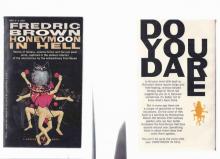 Hall of Mirrors
Hall of Mirrors Honeymoon in Hell
Honeymoon in Hell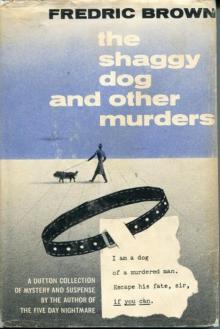 The Shaggy Dog and Other Murders
The Shaggy Dog and Other Murders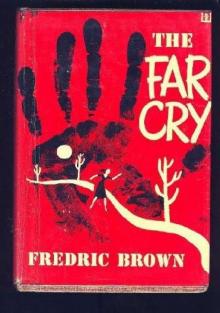 The Far Cry
The Far Cry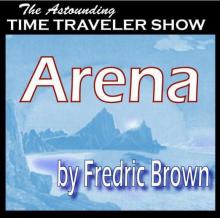 Arena
Arena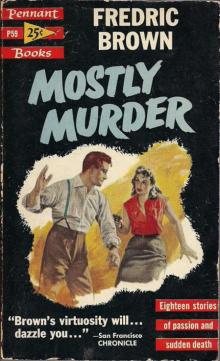 Mostly Murder
Mostly Murder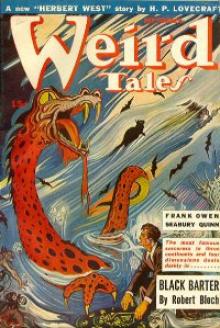 The Geezenstacks
The Geezenstacks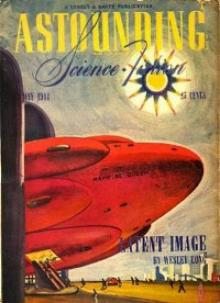 The Yehudi Principle
The Yehudi Principle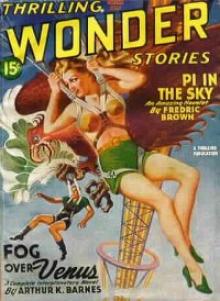 Pi in the Sky
Pi in the Sky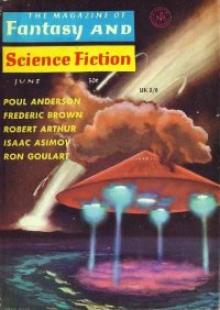 Eine Kleine Nachtmusik
Eine Kleine Nachtmusik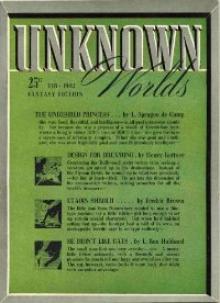 Etaoin Shrdlu
Etaoin Shrdlu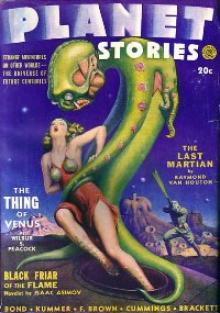 The Star Mouse
The Star Mouse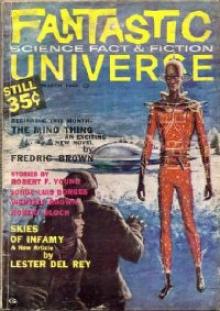 The Mind Thing
The Mind Thing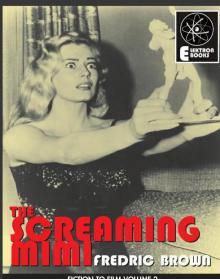 The Screaming Mimi
The Screaming Mimi The Fabulous Clipjoint
The Fabulous Clipjoint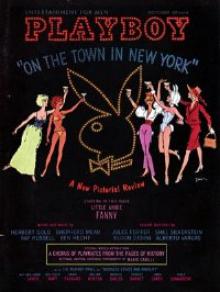 Puppet Show
Puppet Show It Didn't Happen
It Didn't Happen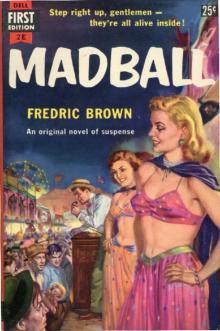 Madball
Madball Happy Ending
Happy Ending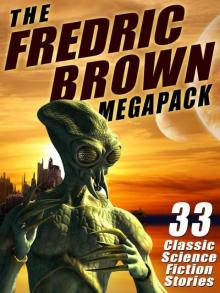 The Fredric Brown Megapack: 33 Classic Science Fiction Stories
The Fredric Brown Megapack: 33 Classic Science Fiction Stories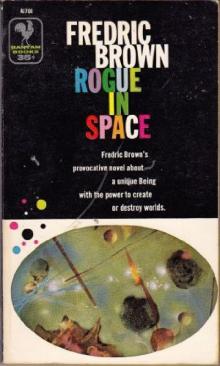 Rogue in Space
Rogue in Space Night of the Jabberwock
Night of the Jabberwock The Dead Ringer
The Dead Ringer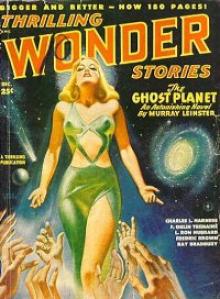 Knock
Knock We All Killed Grandma
We All Killed Grandma Space On My Hands
Space On My Hands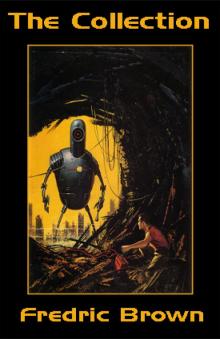 The Collection
The Collection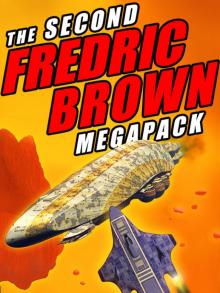 The Second Fredric Brown Megapack: 27 Classic Science Fiction Stories
The Second Fredric Brown Megapack: 27 Classic Science Fiction Stories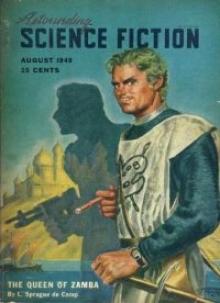 Letter to a Phoenix
Letter to a Phoenix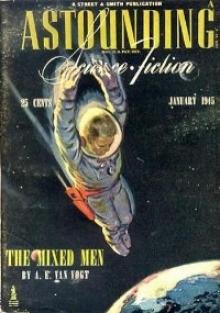 The Waveries
The Waveries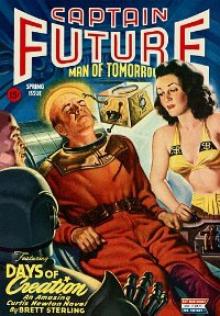 Nothing Sirius
Nothing Sirius The Deep End
The Deep End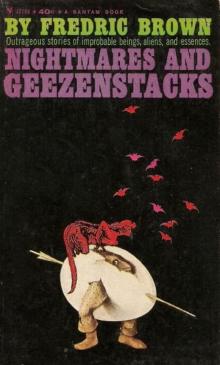 Nightmares & Geezenstacks
Nightmares & Geezenstacks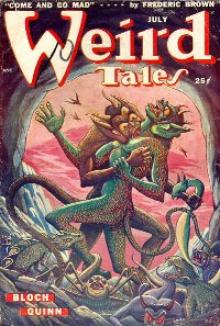 Come and Go Mad
Come and Go Mad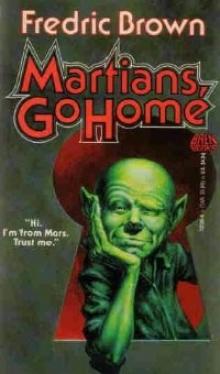 Martians, Go Home
Martians, Go Home